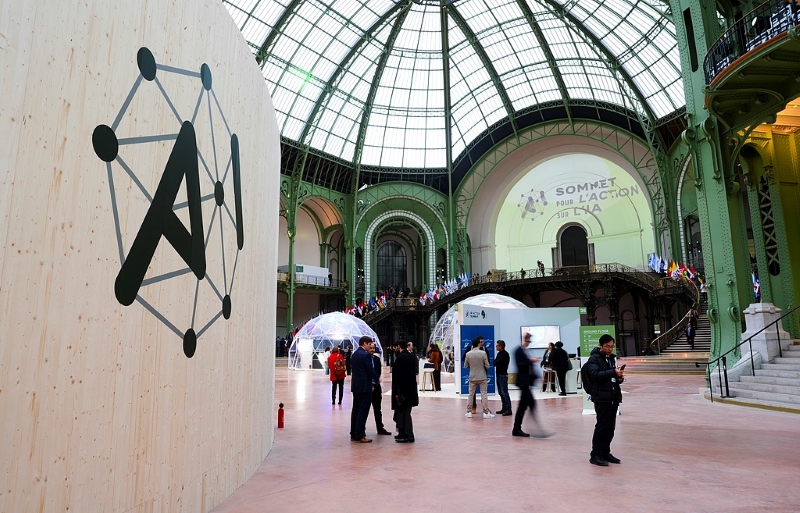French President Macron recently said in an exclusive interview with CNN that Europe has not joined the global artificial intelligence (AI) race today. “We are behind,” he bluntly stated. “We need an AI agenda because we must bridge the gap with the United States and China in the field of AI.” As the global AI race intensifies, why has Europe, despite being a technological powerhouse, earned the label of “laggard” in this field? When did Europe’s lag in AI begin, and what caused it? Several experts who generally believe that Europe’s lack of competitiveness in AI is a continuation of its earlier lag in the internet sector. Over-regulation by governments, insufficient AI investment, and inadequate talent development have all contributed to Europe’s disadvantage in the AI race.
Three Factors Contributing to Europe’s Lack of Competitiveness
In his interview with the U.S. media, Macron specifically mentioned that fundraising will be key to Europe’s development of AI, particularly attracting investments from the United States and Gulf Arab countries. Macron stated that this is an area where Europe “must do better.” He believes that Europe must protect its manufacturers from the competitive pressures of the U.S. and China. More importantly, he emphasized the need to relax investment regulations in order to prevent European investments from “flowing” to the U.S.
A recent report by the World Economic Forum reveals that between 2015 and 2022, large European companies invested €700 billion annually, less than their American counterparts, especially in the technology sector, as the return on investment capital (ROIC) of European companies lagged behind the U.S. by 4 percentage points. Of the 14 technologies considered crucial for the future of the global economy, Europe is currently only effectively competing with the U.S. and China in 4 of them.
The development of the internet and AI industries requires abundant startup capital, and the European Union has recognized that its strict regulations and highly politicized policy direction have led to a decline in capital interest in AI industry investments. Bill Bich, a fellow at Bell Labs in the United States, pointed out that the U.S. has abundant startup funding for the internet and AI industries, while China’s startup capital is relatively limited. However, due to its rapid development and large market potential, the Chinese internet sector has already attracted substantial foreign investment in its early stages, greatly benefiting the entire industry chain. In contrast, “Europe lacked investment in the early stages of the internet’s development, missing the boat. As a result, it is inherently disadvantaged in later AI development. Catching up will be a long and difficult journey.”
In terms of regulation, the EU is often regarded as the region with the strictest technology regulations globally, and this extends to AI. “Europe focuses too much on regulating AI instead of promoting innovation,” as Macron warned, “We are regulating ourselves out of the market.” “AI requires a more relaxed development environment, whereas European governments are too strong in their regulatory stance.” Bich believes that the development of the internet needs to reduce regulation, especially regarding the vast amounts of data needed for large models, which have significant implications for issues like copyright and privacy.
Liang Huaixin, a researcher at the Institute for National Security and Governance at the University of International Business and Economics, analyzed that some European governments have become “obstacles to the deep integration of industry and science.” He pointed out that Europe’s “over-regulation” of AI stems, on the one hand, from the EU’s tendency towards “political correctness” in areas like artificial intelligence and green environmental policies in recent years, and on the other hand, from the desire to counter the dominance of U.S. AI in the EU market and prevent Europe from becoming a “digital colony.” However, the result has been an increasing gap between the EU and other global players.
Additionally, the quantity and quality of talent largely determine a country’s level and potential for AI development. In the early days of artificial intelligence, the EU‘s training of AI talent lagged behind that of the U.S., but had some advantages over China. “However, today, the cultivation of AI talent in Europe is insufficiently dynamic due to external influences, and strict regulatory and investment policies have led to a severe lack of ability to attract external AI talent. It can be said that the EU’s initial approach to the AI industry has led to its current predicament,” Liang Huaixin stated. Bich also mentioned that Europe does not lack talent, but because there is no conducive environment for development, it is difficult to form the required high-density concentration of top-tier talent. “Therefore, the issue is not a lack of talent, but a lack of an environment where talent can develop.”
Forbes magazine believes that Europe possesses considerable knowledge in artificial intelligence, with the number of AI publications being comparable to that of the United States. “However, this knowledge has not been effectively translated into AI applications. For Europe, training will be key.” In addition to insufficient investment, over-regulation, and weak talent development, Birgit König, Chairwoman of the Executive Board and CEO of Merck Group in Germany, previously stated that issues such as improving Europe’s competitiveness have long existed. Some of these issues stem from over-regulation, but this is not the only reason. For example, Europe’s lag in AI and other technologies is also related to market fragmentation.
Tracing Back to the Era of Internet Development
“Europe’s lag in AI can be traced back to the era of internet development,” said Bich. Looking at the development of AI in both China and the U.S., the hardware backbone of AI is chip companies, while the main force and resources for AI software research and development mostly come from internet companies. U.S. AI software is based on the research and development of companies like Google and Meta. Startups like OpenAI have also developed based on the research results of U.S. internet companies, building upon the work of giants. In this regard, Europe was already behind in the internet sector.
Liang Huaixin analyzed that the EU, which lagged behind the U.S. in the previous internet wave, made matters worse in 2016, the year considered the “dawn of artificial intelligence,” when it introduced the General Data Protection Regulation (GDPR) and subsequently implemented even stricter AI regulations. This directly led to the EU’s disadvantage in the field of general artificial intelligence.
So, what can Europe do now to foster competitiveness in AI? This question was raised by Forbes in a report on the 10th. Just before the opening of the AI Action Summit, Macron announced that he would attract €109 billion in private investment to promote the development of AI in France. According to The New York Times, Macron believes that France is fully capable of leading AI development in Europe, partly because about 70% of France’s electricity comes from nuclear energy, enabling it to support data center operations without jeopardizing climate change goals.
Similarly, Germany, which is also strongly pushing for AI development, has recently received new news. U.S. AI company OpenAI is set to open its first office in Munich, Bavaria, which some reports suggest highlights Germany’s significant role in this field. However, a report released last July by Germany’s Development Bank (KfW) stated that Germany is falling behind the U.S. and China in the race to develop AI applications, and the gap is widening. Germany currently imports far more AI products and services than it exports, making it increasingly dependent on foreign technologies, which undermines its competitiveness in the AI sector.
Germany’s Minister for Digital and Transport, Wissing, believes that Germany has good competitive conditions for AI development but needs improvements in financing. He emphasized that it must be made easier for investors to provide venture capital for companies seeking to go public. Moreover, new products and enterprises should not be overly hindered by excessive regulations.
In terms of talent development, training AI talent is a priority in France’s “France 2030” investment plan. Macron stated that the number of young people trained in AI in France will increase from 40,000 to 100,000. In Germany, the Federal Government released its “AI Strategy” in 2018, which was further updated in 2020 to strengthen the cultivation of both academic and vocational talents. In 2022, Germany’s Federal Ministry of Education and Research announced plans to invest €24 million to support AI talent development.
In addition to France and Germany adjusting their AI development strategies, the EU has also recognized the issues caused by “over-regulation.” European Commission Executive Vice-President for Digital Strategy, Margrethe Vestager, stated in an interview with Reuters: “We have too many overlapping regulations, and we will reduce bureaucracy and the administrative burden on industries.” On the 11th, European Commission President Ursula von der Leyen announced the “Investing in AI” initiative at the AI Action Summit, aimed at mobilizing €200 billion in investment to drive AI development.
“Perhaps the greater risk now is missing the opportunity once again.”
Recently, the Chinese artificial intelligence company DeepSeek has garnered widespread attention due to its low-cost, high-efficiency business model. According to an Associated Press report, the functionality of DeepSeek’s technology rivals that of Western technologies like ChatGPT, which has been seen by the American tech community as a “wake-up call.” However, for Europe, it symbolizes hope. The “Political News Network” in the U.S. stated that for Europe, this is an encouraging sign, showing that the European AI industry finally has a chance to compete with the United States in the global AI race.
The latest report points out that some believe DeepSeek’s rise proves that even if Europe lacks the massive capital to invest in computing power, it may not necessarily hinder its progress in the global AI competition. European companies like France’s Mistral and Germany’s Aleph Alpha could also carve out a place for themselves in the global AI race. France’s International Radio Station notes that Mistral represents Europe’s greatest hope for challenging the U.S. AI giants. Founded in 2023, Mistral is a French AI startup created by researchers from tech giants such as Google’s DeepMind and Meta, and it has released a series of open-source AI models. Mistral claims that its technology can achieve efficiency comparable to that of OpenAI, while requiring less computing power. In an interview, Mistral’s co-founder and CEO, Arthur Mensch, stated that DeepSeek’s success showed him the potential path to success for Mistral and European technology.
Chinese digital economy scholar Liu Xingliang noted that Mistral’s rise shows that despite the gap in computing power and financial investment between Europe and countries like the U.S. and China, Europe still has potential in the AI field. The success of Mistral’s Le Chat in France demonstrates the demand and recognition for local AI technology in the European market, and could drive further innovation and investment. Particularly, Mistral’s announcement of building a data center in southern Paris reflects its investment in local computing power and infrastructure, which could further help propel the development of Europe’s AI industry. Liu Xingliang believes that if Mistral continues to expand its technological advantages, attract more investment, and compete with other AI giants in the global market, it could become a key player in European AI development. Additionally, Europe’s emphasis on technological sovereignty and data privacy could provide a favorable policy environment for it. However, whether it can compete with AI companies from the U.S. and China in the global market depends on Mistral’s ongoing efforts in technological innovation, talent attraction, and international cooperation.
Regarding the performance of the French startup and France’s initiatives to promote AI development, the CEO of AI video company Synthesia said, “At least in Europe, we are starting to see the emergence of leaders, which is exactly what we need.” The U.S. CNBC website reported on the 12th that although Europe’s image of “over-regulation” has not completely changed, some in the tech industry believe Europe is moving in the right direction.
However, Chris Lehane, Vice President of Global Policy at OpenAI, who attended the AI Action Summit, stated, “You can feel that Europe has almost reached a crossroads, with the EU considering a much stricter regulatory approach.” He also remarked that European countries like France, Germany, and the UK may want to develop in a direction that truly embraces innovation. Lehane further stated, “I believe that at this summit, you will begin to see a different definition or consideration, and perhaps for Europe, the bigger risk now is missing the opportunity once again.”













Leave a comment